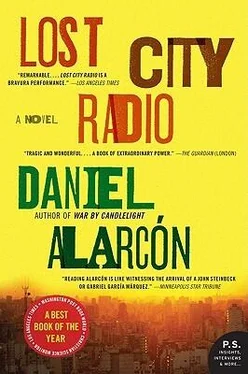BACK HOME, they had played games, too. Different kinds: they ran into the forest and hid there. They imitated the frantic music of the jungle animals and frightened the girls. Those were happy memories. The kids took turns reinventing the stories the old people told: about fires and wars, about rivers that changed course in the middle of the night, about Indians who spoke a language even older than their own.
These were strange times. Victor was among strange people. He had never asked his mother about the city, and there was no one else he would have trusted. Plenty of people told stories about it, but they had no way of knowing. Once, Nico returned from a trip to the provincial capital with his father and said he had seen a magazine from the city. Some of the younger kids didn’t know what a magazine was; Nico used the word for book . “But with more pictures,” he explained. “Pictures of the city,” he said, and everyone wanted to know pictures of what exactly . Describe it. Tell us — they were all dying to know. Nico said little. He was coy, almost smug. It was the way he drew a crowd to him, with a sly smile, always holding back, and he began his list: photos of wide streets, shiny cars. “Asphalt,” he said importantly, and the children nodded. Powerful factories, noisy machines, crowded parks — wait.
“Noisy machines?” Victor asked. He couldn’t help it. “What does a picture of a noisy machine look like?”
Nico grabbed one of the smaller boys by the shoulders and shook him. “Like this,” he said. Everyone laughed, even the boy. He was just happy to be included.
“What else?” Victor asked.
Nico frowned, and continued his list: churches, plazas, trains. These were just words, and they were all impatient for something more, something exactly right, something new. By the time Nico said “tall buildings,” the children, Victor first among them, groaned. Of course there were tall buildings — wasn’t it a city? Everyone had heard of those.
Nico laughed. “Oh, yeah, you know all about the city, don’t you?” He looked right at Victor. Nico picked up a stick. “Draw it then.”
“Draw what?”
“The city.”
Victor smiled. “You can’t draw a city.” He started laughing and, to his surprise, everyone laughed with him.
“Yeah, Nico. You can’t draw a city,” they echoed. They stretched the word out, let it linger: draaaaaaw .
But what if he had? What if you could? This is not what he imagined: not these people, not this house. Not this puzzle, not the radio, full of light and metal. Not any of it: not Norma and her mystery, not the image of the father he didn’t remember, not the list of names, the commercial, or the woman selling bread and cursing them. Draw the city: dark and dense, a knot that can’t be untied. Tall buildings, indeed. Shiny cars — he hadn’t come across one yet. Victor closed his eyes and yawned. It was the night of the longest day he could remember. He knew enough to know that it was cold outside.
In his life, Victor had told three lies that he considered important. The first, to his teacher, not Manau but a previous one. Victor cheated on a geography test — everyone had looked at the maps his father had left. He had let them; they were the only maps in town. With the passing of time, this transgression seemed less and less significant, but he could, if he tried, still recall the anxiety of that day. The second, to Nico: I don’t remember. Victor had said it with his jaw set, stern, so convincing he almost believed it himself. Swear, Nico said. Promise. And Victor did, without hesitation, though the memory of tadek never left him alone. The third, to his mother: do you remember your father? she’d asked him once, and there seemed, from the way her voice quavered, from the dull sadness in her eyes, to be only one correct answer. She pulled him to her when he nodded, and began to sob. She couldn’t have believed him.
THE WAY Rey figured it, this was the problem: you did not quit the IL — how could you, if you had never joined it? If its existence was not acknowledged, not even between you and your contact? The situation was alluded to, as if it were something that had sprouted, wild and unbidden, from the earth. It was remarked upon, shaped indirectly by your actions, but this fact you could not admit to yourself or to anyone. You read the news and, like all your countrymen, shook your head in dismay at the downward spiral of events. You didn’t allow yourself to feel responsibility for any of it.
Even at this late date, some nine years into the war, there were a few adventurous newspapers and radio stations that raised doubts as to whether any organized armed insurgency existed. It might have been shocking to hear if it hadn’t been so commonplace. Bogeymen, they said, created by the government with the transparent aim of manipulating a terrified population. Camps in the jungle — the very camps Rey had visited? Hogwash, aerial photographs doctored in a lab. The IL, they said, was shorthand for the many varieties of rage loose within the borders, an unrecognized complaint given voice, lumped together by the powers-that-be beneath one unseemly umbrella. It represented the inability of the governing and literate classes to comprehend the depth of the people’s unhappiness. Every angry young man with a rock in his hand — was he a subversive? The learned analysts scoffed at the notion, as if such a thing were unthinkable, but Rey listened and thought to himself: Yes. They are, every last one of them. Whether he knows it or not, that young man is doing our work. Our plan includes him, just as it included me even before the IL had a name.
Over the years, Rey had developed an intuitive understanding of the plan. Coordinated attacks on the more vulnerable symbols of government power: remote police outposts, polling places in distant villages. A campaign of propaganda that included the infiltration of newspapers and radio stations; the maintenance of camps in the jungle for arms training, in preparation for an eventual assault on the capital. Meanwhile, in the city, kidnappings and ransoms, in order to finance the purchase of weapons and explosives facilitated by supporters abroad. Daring prison breaks to impress the average man. No one had ever shown him a manual, nor did Rey know who decided which targets would be destroyed. Communiqués were signed simply THE CENTRAL COMMITTEE and appeared on city streets suddenly, as if dropped from the skies. The violence was ratcheted up: encircle the city, instill terror. The campaign depended upon military escalation from the forces of order, drew strength and purpose from the occasional massacre of innocents, or the disappearance of a prominent and well-liked sympathizer.
What did it all mean?
Consider the improbability of it: that the multiple complaints of a people could somehow coalesce and find expression in an act — in any act — of violence. What does a car bomb say about poverty, or the execution of a rural mayor explain about disenfranchisement? Yet Rey had been a party to this for nine years. The war had become, if it wasn’t from the very beginning, an indecipherable text. The country had slipped, fallen into a nightmare, now horrifying, now comic, and in the city, there was only a sense of dismay at the inexplicability of it. Had it begun with a voided election? Or the murder of a popular senator? Who could remember now? They had all been student protesters, had felt the startling power of a mob, shouting as one chorus of voices — but that was years ago, and times had changed. No one still believed all that, did they? The war had bred a general exhaustion. It was a city of sleepwalkers now, a place where another bomb hardly registered, where the Great Blackouts were now monthly occurrences, announced in vitriolic pamphlets slipped beneath windshield wipers like shopping circulars. The government retaliated every fortnight with its army of poorly trained boy-soldiers, one or two died in the crossfire, and partisans took to the streets, filling the long avenues and clashing with riot police, before racing home to listen to descriptions of themselves on the radio news the same evening. Marches became riots of predictable fury, buildings burned while firemen watched, and so on and so on.
Читать дальше












